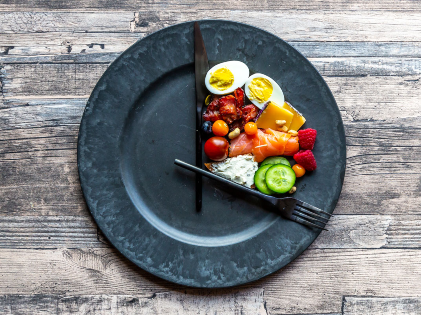 Insulin is a hormone produced by the pancreas that our body needs primarily to survive. It helps the cells in your body absorb the glucose in your blood, making your cells function optimally. Insulin is what helps maintain blood sugar levels.
Insulin is a hormone produced by the pancreas that our body needs primarily to survive. It helps the cells in your body absorb the glucose in your blood, making your cells function optimally. Insulin is what helps maintain blood sugar levels.
Without enough insulin, you may have type 1 diabetes, and when you have too much of it, you may end up with Type 2 diabetes. When the insulin levels are too high, you may get a condition called insulin resistance, leading to PCOS (Polycystic Ovarian Syndrome) and diabetes (Type 2). Many symptoms may tell you that you are suffering from insulin resistance, right from weight gain, sugar cravings, feelings of anxiety and panic, and more. It is important to treat it right at the onset to avoid type 2 diabetes from developing.
Reduce Your Carb Intake

Most of us love carbs. But if you are insulin resistant, too much of it may not be good for you. Your insulin levels may go on overdrive. Going low-carb is the only way to minimize insulin spikes, lower your blood pressure levels, and aid in weight loss. Note we are not saying no-carbs. We are saying low-carbs.
A little bit of it is okay, but remember to increase your good fat intake, moderate protein, and only a little carb. If you are looking for the perfect diet plan for you, then a Mediterranean-style diet, is a great option for you, with more veggies, more fiber, and lots of healthy fats in eating nuts, fish, and healthy oils. Read olive oil. It’s an easy diet to follow and is often one of the most successful diets worldwide.
Control Portions
 Watch what you eat and watch how much you eat. Remember to eat small amounts one at a time, as when you eat more. Your pancreas produces more insulin.
Watch what you eat and watch how much you eat. Remember to eat small amounts one at a time, as when you eat more. Your pancreas produces more insulin.
Overeating leads to hyperinsulinemia. It affects you when your body weight is high, and you suffer from insulin resistance.
Avoid Sugar
Sugar isn’t your best buddy. And no matter how much you love it, you must avoid crowding your plate with all the sweet stuff, which come to think of it, isn’t too sweet for you. Research shows, that overeating sugar can give rise to higher insulin levels, which may give rise to metabolic conditions.
Intermittent Fasting
 There’s a lot of information on the net today, on how to do, intermittent fasting (IF). So, is it good for you? Or bad for you? We think it is a superb way of reducing your insulin levels. Instead of going for 16 hours without, what works for us is the gentle course of intermittent fasting.
There’s a lot of information on the net today, on how to do, intermittent fasting (IF). So, is it good for you? Or bad for you? We think it is a superb way of reducing your insulin levels. Instead of going for 16 hours without, what works for us is the gentle course of intermittent fasting.
Finish your dinner early, say at 7 pm and eat breakfast at 7 am. There you have easily stayed away from food for 12 hours. If you are comfortable with this way of eating, you can gradually increase the non-eating time. But then again, IF may not be for you. You can only find out by trying it out. Even if you do not do it every day, try it every other day.
Soluble Fiber
When you amp up your fiber intake, it absorbs fiber, which turns into a gel. This slows down the pace of the food moving through your digestive tract. This helps you feel fuller for a longer period. When you are full, you are less likely to reach out for snacks.
Eating too often can also spike your insulin levels. Furthermore, soluble fiber feeds the good type of bacteria in your colon, increasing insulin sensitivity. Foods high in soluble fiber include prunes, figs, apples, beans, oats, avocados, brussels sprouts, broccoli, sweet potatoes, and more.
Build Muscles

While we know, exercise can be your best bet to tackle insulin resistance. We don’t know what kind of exercise you should do, to increase insulin sensitivity? Well, weight training is your answer in this case. Resistance training helps drop the extra fat and build muscles.
Resistance training improves muscle mass, which increases the amount of glucose that your body uses to help improve insulin sensitivity. The best approach to tackle insulin resistance and any metabolic issues is to try a combination of cardio and strength training.
While most of these methods are tried and tested, talk to your health care practitioner before trying any of them. A little bit of care can go a long way in helping you stay fit and healthy in the long run.




